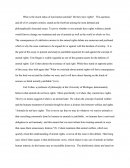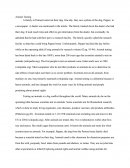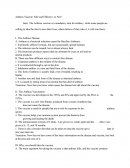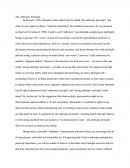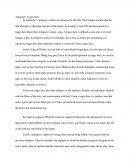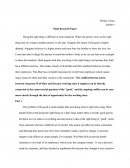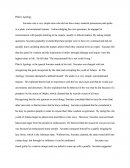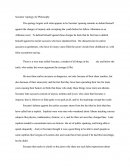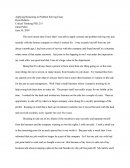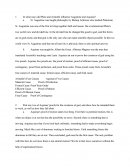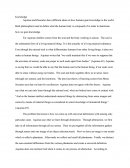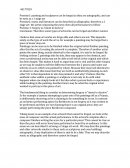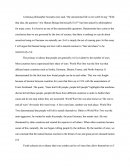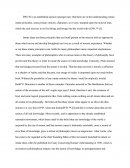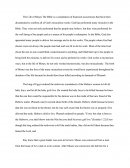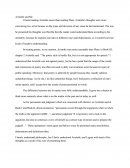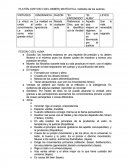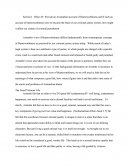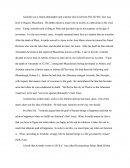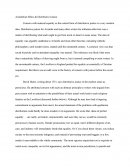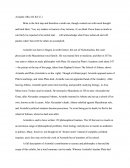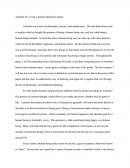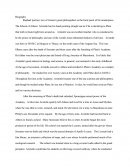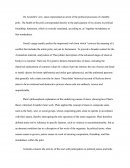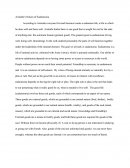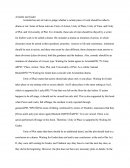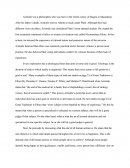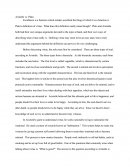Philosophy
There are many popular essays and research papers on Philosophy on Essays24.com.
You can view research papers and essays or use search engine.
-
Animal Rights
What is the moral status of non-human animals? Do they have rights? This question, and all of it's complex entities, stands at the forefront among the most debated and philosophically dissected issues. To prove whether or not animals have rights without a doubt would forever change our treatment and use
Rating:Words: 2,620 • Pages: 11 -
Animal Testing
Animal Testing A family in Pennsylvania lost their dog. One day, they saw a photo of the dog, Pepper, in a newspaper. A dealer was mentioned in the article. The family tracked down the dealer who had their dog. It took much time and effort to get information from the
Rating:Words: 634 • Pages: 3 -
Anselm's Ontological Argument
Anselm's ontological argument is a priori proof of God's existence. Anselm begins his argument with ideas that do not depend on experience and progress to a throughly logical explanation that God necessarily exists. Anselm's goal is to prove to the "fool" that God has to exist. He says that anyone
Rating:Words: 416 • Pages: 2 -
Anthrax
Anthrax Vaccine: Safe and Effective, or Not? Intro: The Anthrax vaccine is a mandatory shot for military; while some people are willing to take the shot to save their lives, others believe if they take it, it will ruin theirs. I. The Anthrax Disease A. Anthrax is a bacterial infection
Rating:Words: 874 • Pages: 4 -
Anthropic Principle
The Anthropic Principle In the early 1970s, Brandon Carter stated what he called "the anthropic principle": that what we can expect to observe "must be restricted by the conditions necessary for our presence as observers" (Leslie ed. 1990). Carter's word "anthropic" was intended as applying to intelligent beings in general.
Rating:Words: 538 • Pages: 3 -
Antigone
Antigone's Tragic Hero In Sophocle's Antigone, readers are deceived by the title. Most readers assume that the title character is the tragic heroine of the drama. In actuality, Creon fills the description of a tragic hero better than Antigone in many ways. A tragic hero is defined as one who
Rating:Words: 396 • Pages: 2 -
Antigone Comparison Paper
Wesley Vance 5/8/2015 Main Research Paper Doing the right thing is difficult in most situations. What one person views as the right thing may be wrong to another person. In the play Antigone the nature of the good is highly debated. Antigone believes in a higher power and must bury
Rating:Words: 2,741 • Pages: 11 -
Apology
Plato's Apology Socrates was a very simple man who did not have many material possessions and spoke in a plain, conversational manner. Acknowledging his own ignorance, he engaged in conversations with people claiming to be experts, usually in ethical matters. By asking simple questions, Socrates gradually revealed that these people
Rating:Words: 1,334 • Pages: 6 -
Apology
Socrates' Apology for Philosophy The apology begins with what appears to be Socrates' opening remarks to defend himself against the charges of impiety and corrupting the youth before his fellow Athenians in an Athenian court. To defend himself against these charges he feels that he first has to defend himself
Rating:Words: 1,801 • Pages: 8 -
Applying Reasoning To Problem Solving Essay
Applying Reasoning to Problem Solving Essay Ryan Roberts Critical Thinking PHL 251 Juliet Pailes June 30, 2004 The most recent time I have that I was able to apply reasons and problem solving was just recently with the former company in which I worked for. I was recently laid off
Rating:Words: 554 • Pages: 3 -
Aquinas And Augustine
1. In what ways did Plato and Aristotle influence Augustine and Aquinas? a. St. Augustine was taught philosophy by Bishop Ambrose who studied Platonism. St. Augustine was one of the first to bring together faith and reason. He revolutionized Plato's two world view and divided line. In the divided line
Rating:Words: 1,137 • Pages: 5 -
Aquinas And Descartes View Of Knowledge
Knowledge Aquinas and Descartes have different ideas on how humans gain knowledge in the world. Both philosophers need to define what the human body is composed of in order to determine how we gain knowledge. For Aquinas intellect comes from the soul and the body working in unison. The soul
Rating:Words: 1,493 • Pages: 6 -
Are Art Woks Forgeable?
40177029 Premise1: painting and sculptures can be forged as they are autographic, and can be seen as a 1 stage art Premise2: music and literature can be described as allographic, therefore a 2 stage art- the artist composing the piece, then all performances to follow Premise 3: forgery as 'intent
Rating:Words: 920 • Pages: 4 -
Are Humans Good Or Evil By Nature?
A famous philosopher Socrates once said, "the unexamined life is not worth living." With that idea, the question "Are Human Beings Intrinsically Evil?" has been asked by philosophers for many years. It is known as one of the unanswerable questions. Determinists have come to the conclusion that we are governed
Rating:Words: 1,511 • Pages: 7 -
Are There Any Innate Ideas?
�It is an established opinion amongst men, that there are in the understanding certain innate principles; some primary notions, characters, as it were, stamped upon the mind of man, which the soul receives in its first being, and brings into the world with it.’ [1] Innate ideas are those principles
Rating:Words: 2,522 • Pages: 11 -

Arguments For The Existence For God
Arguments for the Existence for God 1. The Cosmological Argument for the existence of God is based on the principle of cause and effect. What this basically means is that the universe was the effect of a cause, which was God. One of the oldest and most well known advocates
Rating:Words: 1,238 • Pages: 5 -
Aristole The Philosopher
The Life of Moses The Bible is a compilation of historical occurrences that have been documented to confirm all of God's miraculous works. God has performed many miracles in the Bible. They were not only performed that his people may believe, but they were performed for the well being of
Rating:Words: 1,726 • Pages: 7 -
Aristoltle Vs. Plato
Aristotle and Me I found reading Aristotle easier than reading Plato. Aristotle's thoughts were more convincing too, as he focuses on the types and divisions of any issue he had mentioned. The way he presented his thoughts was flexible that the reader could understand them according to his mentality, because
Rating:Words: 315 • Pages: 2 -
Aristoteles
PLATÓN (CRITON O DEL DEBER) MAYÉUTICA, métodos de los autores VIRTUDES IGNORANCIA RAZÓN “EL ENTENDIDO” “EL ALMA” LEYES La virtud va unida al conocimiento La justicia como más grande virtud La maldad va unida a la ignorancia Manda cualquier acto Referencia a Dios, que se le identifica con la Verdad
Rating:Words: 4,150 • Pages: 17 -
Aristotelian Account Of Blameworthiness
Section I : Ethics Ð'- Provide an Aristotelian account of blameworthiness and If such an account of blameworthiness were to become the basis of our criminal justice system, how might it affect our system of criminal punishment Aristotle's view of blameworthiness differs fundamentally from contemporary concepts of blameworthiness as practiced
Rating:Words: 1,643 • Pages: 7 -
Aristotle
Aristotle was a Greek philosopher and scientist who lived from 384-322 B.C who was born in Stagira, Macedonia. His father played a major role in society as a physician in the royal court. Young Aristotle took a liking to Plato and decided to go to his academy at the age
Rating:Words: 1,563 • Pages: 7 -
Aristotle
Aristotelian Ethics & Distributive Justice Concern with material equality as the central form of distributive justice is a very modern idea. Distributive justice for Aristotle and many other writers for millennia after him was a matter of distributing what each ought to get from merit or desert in some sense.
Rating:Words: 681 • Pages: 3 -
Aristotle
Aristotle (384-322 B.C.E.) Mine is the first step and therefore a small one, though worked out with much thought and hard labor. You, my readers or hearers of my lectures, if you think I have done as much as can fairly be expected of an initial start. . . will
Rating:Words: 1,242 • Pages: 5 -
Aristotle
Aristotle Ð'- Living a human life/human nature Aristotle was a man of philosophy, science, and mathematics. He used these three tools to explain what he thought the purpose of being a human being was, and just what being a human being entailed. To describe what a human being was, he
Rating:Words: 1,649 • Pages: 7 -
Aristotle
Biography Raphael portrays two of Greece's great philosophers as the focal point of his masterpiece The School of Athens. Aristotle has his hand pointing straight out as if he is declaring to Plato that truth is found right here around us. Aristotle was an excellent teacher who is considered to
Rating:Words: 2,350 • Pages: 10 -
Aristotle & Plato On Stasis
On Aristotle's view, stasis represented an arrest of the political processes of a healthy polis. The health of the polis corresponded directly to the participation of its citizens in political friendship, homonoia, which is correctly translated, according to, as "together-mindedness or like-mindedness. Greek's usage usually prefers the impersonal verb form
Rating:Words: 567 • Pages: 3 -
Aristotle And Eudaimonia
Aristotle's Notion of Eudaimonia According to Aristotle everyone first and foremost wants a eudaimon life, a life in which he does well and fares well. Aristotle thinks there is one good that is sought for not for the sake of anything else: the summum bonum (greatest good). The greatest good
Rating:Words: 334 • Pages: 2 -
Aristotle And Godot
Aristotle and Godot Aristotle has sets of rules to judge whether a certain piece of work should be called a drama or not. Some of those rules are Unity of Action, Unity of Place, Unity of Time, and Unity of Plot, and Universality of Plot. For Aristotle, these sets of
Rating:Words: 1,103 • Pages: 5 -
Aristotle Essay
Aristotle was a philosopher who was born in the Greek colony of Stagira in Macedonia. After his father’s death, Aristotle went to Athens to study under Plato. Although they had different views on ethics, Aristotle was considered Plato’s most talented student. He created the first systematic treatment of ethics in
Rating:Words: 660 • Pages: 3 -
Aristotle Vs. Plato
Aristotle vs. Plato Excellence is a function which renders excellent the thing of which it is a function is Plato's definition of virtue. What does this definition really mean though? Plato and Aristotle both had their own unique arguments devoted to the topic at hand, and their own ways of
Rating:Words: 1,479 • Pages: 6
